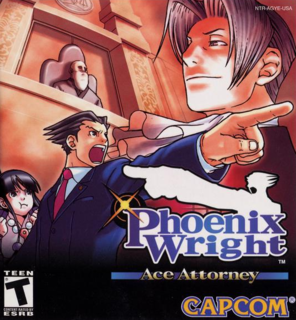This text-based story driven game uses the stylus and mic well but shows the world that graphics is not everything!
Phoenix Wright has you starting off as a lawyer in his first case- a murder case. It's more a tutorial than anything else but it does get your gears spinning in your mind. Primarily, there are two modes. One of them is investigation, where you collect clues and information from witnesses and others, and the other is the defense proceedings in court.
In court, you primarily listen to witnesses testify and it is your job to find contradictions causing them to change their stories until the truth can be wringed out from their deceptive hides. To do this, you can either press, or present. Pressing has you questioning the witness to elaborate further on their statement while presenting means you have evidence that usually shows the witness is not telling the whole story. Either way, if you play your cards right, you will eventually find the truth.
It can be very satisfying catching someone in a lie and proving what actually happened and who did what after it's all said and done. Another neat feature is the ability to speak into the mic either “hold it,” or “objection” and it will do so as if you hit the buttons on the DS or the stylus. It doesn't really change the gameplay but it is an interesting side note.
The trials have a maximum of three days for trials so the stories unfold in that time line but that doesn't mean you have time restrictions to gather clues or to talk to people. The game is quite linear and most of the contradictions you can find can only be found by choosing the right piece of evidence or pressing the correct statement. To make sure you don't abuse this function, you only have five chances for each chunk of the trial to get it right. If you fail five times, you fail and the preceding is over so you can't keep guessing though time to time, you may be stumped what to do so you may want to give it a try once in a while.
The evidence is the key to the best moments of the game. For example, one witness says he hears the time on the TV and then you can refute that with the blackout report that clearly contradicts it. There are other instances where you have to watch videos and look at maps and photos to pick out the discrepancies. If you're not one to comb over your evidence and look at it once in a while, you're going to make the judge very made, which is okay because you can save almost anywhere but there is only one save slot.
Characters in the game are detailed and seem to have their own unique personalities and it's fun to get to know them as you progress through the game. At the end of it, you actually feel like you know them and you want them to either succeed or fail. Although many of the villains are easily identified because of their traits, it just makes it that much more satisfying when you can them!
The graphics aren't exactly amazing and could have been portrayed on the GBA except for the last mission where 3d graphics are employed. If more of the game was presented that way instead of nicely drawn pictures with three or four frames of animation, it would have been much better but that game is still quite good in this area. The pictures are drawn well and since the game is almost entirely text based, the graphics won't be a glaring issue for the most part.
The music and sounds of the game are so unbelievably good, it's hard to believe there's no soundtrack. When there's a turn in the tide of the court, you can hear the music and you can feel the momentum shifting for or against you. When you catch someone in a lie, it's the same intoxicating feeling that's hard to top in a video game experience. Even though the music does get repetitive, without it, the game would have been sorely lacking. In the end, the game has only five cases totaling about ten or so hours. The game is linear so there's no extra endings or hidden eggs either to encourage to play through again other than the fact that you can zoom past the text with a button for the cases you've already won, which is probably a useful feature if you lend the game to a friend so he can read as quickly as he wants. Unfortunately, the game has little or no replayability so once you beat it, it's hard to play through again but even with that in consideration, it's hard to deny that this heavily text based game, is fun and on the DS it's even funner. It is difficult to say that this game is revolutionary but it's impossible not to get engaged with the characters and the story and in the end, you'll be glad you read through it. It's time for everyone to rise up and say, “OBJECTION!”
One last thing- did anyone else find the music remind you of Shadowrun on the SNES?

